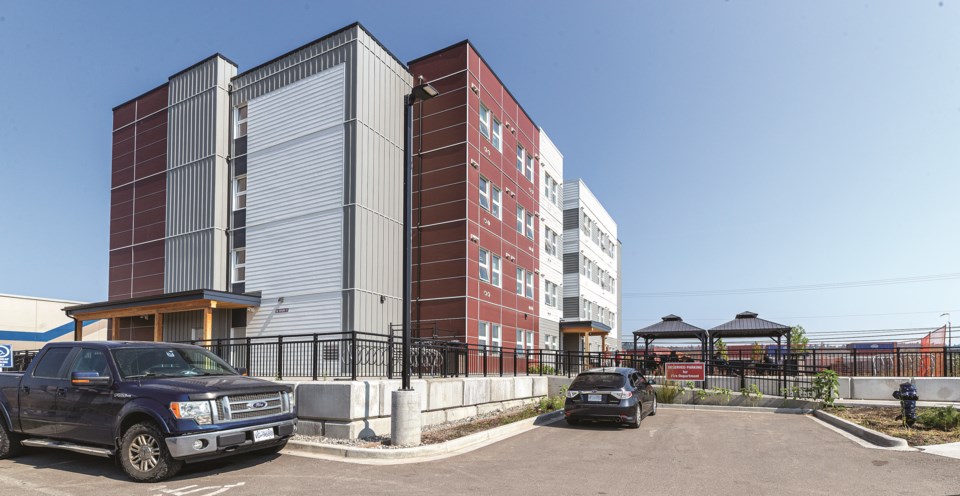Work started in mid-July and construction of the next phase of BC Housing’s First Avenue Supportive Housing project in downtown Prince George is now underway.
The housing project at 140-150 Ontario St. is adjacent to an existing 50-unit four-storey complex that opened two years ago. Once complete, sometime in 2026, the new buildings will provide a health clinic and 51 additional units of housing to support people now homeless or who are at risk of homelessness.
Connective Support Society will be the operator of both residential buildings on the Ontario Street site and will provide residents with on-site services to help them maintain their homes in studio apartments. All residents will be single adults aged 19 and older, some of whom will be seniors and people with disabilities.
The 9,000-square-foot health clinic will be operated by Northern Health and will provide primary care health services to residents and the public.
Ten of the 51 new units will be reserved for complex care provided by Northern Health to serve residents who have significant mental health challenges, addictions because of functional deficiencies as a result of acquired brain injuries.
The existing 50-unit complex opened in June 2022 and is close to capacity.
Connective operates the building and provides residents with on-site staff and support services, including meal programs, life and employment skills training, health and wellness supports, and opportunities for volunteer work. Tenants have access to laundry facilities and a communal kitchen.
As part of a long-term housing facility, residents are allowed to stay indefinitely, as long as they are able to live up to their commitments to keep their apartments clean and undamaged, as outlined in a program agreement.
The society works with other agencies to provide culturally appropriate support to its Indigenous residents, such as healing circles, talking circles, and smudging to promote spiritual healing.
Sarah Chungu, Connective’s Prince George program manager, admits not all of the public is on board with the idea of spending provincial tax dollars on supportive housing and providing care for people who can’t maintain or can’t afford their own residences. But for the past two years she’s seen the impact her staff and the building at 160 Ontario St. is making to improve the lives of their clients.
One former resident who lived in the First Avenue complex for two years got clean after 20 years of drug use and is now studying full-time at the College of New Caledonia, living at the CNC student residence.
Another two-year supportive home care resident, 42-year-old Terra Bruneski, has similar ambitions to return to her post-secondary studies.
“I know there are mixed feelings around the homeless situation in Prince George and other communities in Canada but I see a real transformation as a program manager,” said Chungu. “I see somebody from the streets get stable housing and there’s an instant transformation. They’ve had a shower, they’ve had somewhere to lay their heads, they’ve had a meal. We need more places like this.
“The need is great for Prince George and it keeps growing. We still have a lot of people unhoused in our community.”
As the geographic hub of northern B.C., Prince George has more services for disadvantaged people dealing with poverty, substance addiction, mental and physical health issues. Because of that, the city continues to attract more people from the region who don’t have those services available in their smaller home communities.
Some of the residents have indicated they want to kick their drug habits but Chungu says there’s a shortage of spaces in detox and recovery centres that prevents many from entering those programs. Substance use and mental health issues are often intertwined and the city lacks the resources to adequately deal with either problem.
A safe injection/harm reduction room on the main floor of 160 Ontario St. allows drug users to inject themselves with substances obtained illicitly or through prescription. Smoking is becoming much more common as the method used to take in drugs. However, no smoking is allowed in the building. All staff carry naloxone kits in case of an opiate overdose.
“It happens a lot,” said Chungu. “Once a week, for sure. We started to see very increased OD numbers starting about mid-last year and in the second quarter of 2024 we’re still seeing that. There’s increased usage and more people coming to Prince George from other communities.”
Connective is also operating the 96-unit Victoria Street Supportive Housing complex now being renovated at 1550 Victoria St., the former North Star Inn & Suites. Close to 20 residents are already living in the larger 60-unit building, while the other 36 will eventually be moved into the smaller building.
The society has also been chosen by BC Housing to run the 43-unit Homeless Encampment Action Response Temporary Housing (HEARTH) transitional shelter trailer complex being built next to the Patricia Boulevard (Moccasin Flats) encampment. That’s expected to open sometime this fall.
The HEARTH program finds emergency housing and arranges co-ordinated supports to create permanent/temporary indoor living spaces for people as an alternative to sheltering in encampments or public places.



